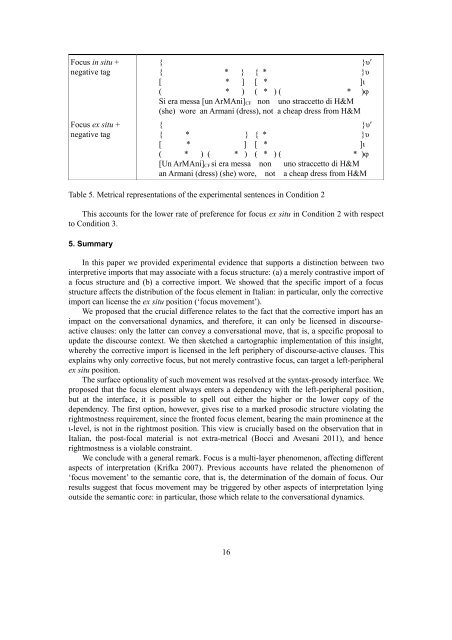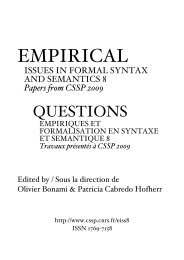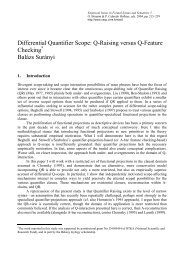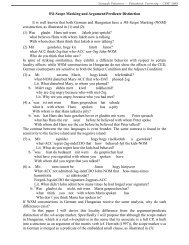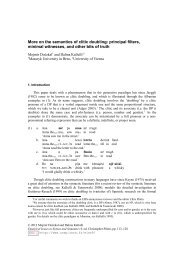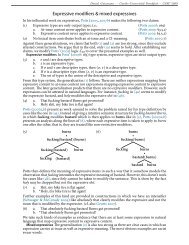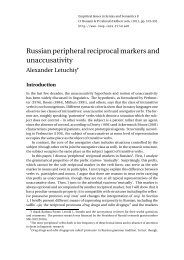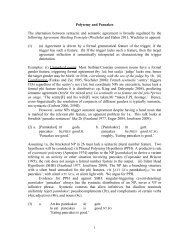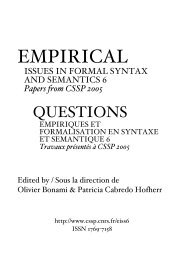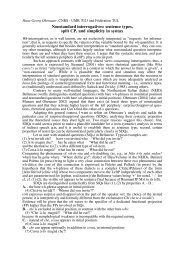Empirical Issues in Syntax and Semantics 9 (EISS 9 ... - CSSP - CNRS
Empirical Issues in Syntax and Semantics 9 (EISS 9 ... - CSSP - CNRS
Empirical Issues in Syntax and Semantics 9 (EISS 9 ... - CSSP - CNRS
Create successful ePaper yourself
Turn your PDF publications into a flip-book with our unique Google optimized e-Paper software.
Focus <strong>in</strong> situ +<br />
negative tag<br />
Focus ex situ +<br />
negative tag<br />
{ }υ′<br />
{ * } { * }υ<br />
[ * ] [ * ]ι<br />
( * ) ( * ) ( * )φ<br />
Si era messa [un ArMAni] CF non uno straccetto di H&M<br />
(she) wore an Armani (dress), not a cheap dress from H&M<br />
{ }υ′<br />
{ * } { * }υ<br />
[ * ] [ * ]ι<br />
( * ) ( * ) ( * ) ( * )φ<br />
[Un ArMAni] CF si era messa non uno straccetto di H&M<br />
an Armani (dress) (she) wore, not a cheap dress from H&M<br />
Table 5. Metrical representations of the experimental sentences <strong>in</strong> Condition 2<br />
This accounts for the lower rate of preference for focus ex situ <strong>in</strong> Condition 2 with respect<br />
to Condition 3.<br />
5. Summary<br />
In this paper we provided experimental evidence that supports a dist<strong>in</strong>ction between two<br />
<strong>in</strong>terpretive imports that may associate with a focus structure: (a) a merely contrastive import of<br />
a focus structure <strong>and</strong> (b) a corrective import. We showed that the specific import of a focus<br />
structure affects the distribution of the focus element <strong>in</strong> Italian: <strong>in</strong> particular, only the corrective<br />
import can license the ex situ position (‘focus movement’).<br />
We proposed that the crucial difference relates to the fact that the corrective import has an<br />
impact on the conversational dynamics, <strong>and</strong> therefore, it can only be licensed <strong>in</strong> discourseactive<br />
clauses: only the latter can convey a conversational move, that is, a specific proposal to<br />
update the discourse context. We then sketched a cartographic implementation of this <strong>in</strong>sight,<br />
whereby the corrective import is licensed <strong>in</strong> the left periphery of discourse-active clauses. This<br />
expla<strong>in</strong>s why only corrective focus, but not merely contrastive focus, can target a left-peripheral<br />
ex situ position.<br />
The surface optionality of such movement was resolved at the syntax-prosody <strong>in</strong>terface. We<br />
proposed that the focus element always enters a dependency with the left-peripheral position,<br />
but at the <strong>in</strong>terface, it is possible to spell out either the higher or the lower copy of the<br />
dependency. The first option, however, gives rise to a marked prosodic structure violat<strong>in</strong>g the<br />
rightmostness requirement, s<strong>in</strong>ce the fronted focus element, bear<strong>in</strong>g the ma<strong>in</strong> prom<strong>in</strong>ence at the<br />
ι-level, is not <strong>in</strong> the rightmost position. This view is crucially based on the observation that <strong>in</strong><br />
Italian, the post-focal material is not extra-metrical (Bocci <strong>and</strong> Avesani 2011), <strong>and</strong> hence<br />
rightmostness is a violable constra<strong>in</strong>t.<br />
We conclude with a general remark. Focus is a multi-layer phenomenon, affect<strong>in</strong>g different<br />
aspects of <strong>in</strong>terpretation (Krifka 2007). Previous accounts have related the phenomenon of<br />
‘focus movement’ to the semantic core, that is, the determ<strong>in</strong>ation of the doma<strong>in</strong> of focus. Our<br />
results suggest that focus movement may be triggered by other aspects of <strong>in</strong>terpretation ly<strong>in</strong>g<br />
outside the semantic core: <strong>in</strong> particular, those which relate to the conversational dynamics.<br />
16


